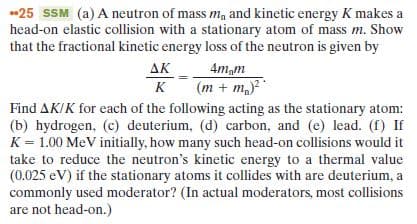*25 SSM (a) A neutron of mass m, and kinetic energy K makes a head-on elastic collision with a stationary atom of mass m. Show that the fractional kinetic energy loss of the neutron is given by ΔΚ 4m,m (m + m,) к K Find AK/K for each of the following acting as the stationary atom: (b) hydrogen, (c) deuterium, (d) carbon, and (e) lead. (f) If K = 1.00 MeV initially, how many such head-on collisions would it take to reduce the neutron's kinetic energy to a thermal value (0.025 eV) if the stationary atoms it collides with are deuterium, a commonly used moderator? (In actual moderators, most collisions are not head-on.)
*25 SSM (a) A neutron of mass m, and kinetic energy K makes a head-on elastic collision with a stationary atom of mass m. Show that the fractional kinetic energy loss of the neutron is given by ΔΚ 4m,m (m + m,) к K Find AK/K for each of the following acting as the stationary atom: (b) hydrogen, (c) deuterium, (d) carbon, and (e) lead. (f) If K = 1.00 MeV initially, how many such head-on collisions would it take to reduce the neutron's kinetic energy to a thermal value (0.025 eV) if the stationary atoms it collides with are deuterium, a commonly used moderator? (In actual moderators, most collisions are not head-on.)
Principles of Physics: A Calculus-Based Text
5th Edition
ISBN:9781133104261
Author:Raymond A. Serway, John W. Jewett
Publisher:Raymond A. Serway, John W. Jewett
Chapter8: Momentum And Collisions
Section: Chapter Questions
Problem 21P
Related questions
Question

Transcribed Image Text:*25 SSM (a) A neutron of mass m, and kinetic energy K makes a
head-on elastic collision with a stationary atom of mass m. Show
that the fractional kinetic energy loss of the neutron is given by
ΔΚ
4m,m
(m + m,)
к
K
Find AK/K for each of the following acting as the stationary atom:
(b) hydrogen, (c) deuterium, (d) carbon, and (e) lead. (f) If
K = 1.00 MeV initially, how many such head-on collisions would it
take to reduce the neutron's kinetic energy to a thermal value
(0.025 eV) if the stationary atoms it collides with are deuterium, a
commonly used moderator? (In actual moderators, most collisions
are not head-on.)
Expert Solution
This question has been solved!
Explore an expertly crafted, step-by-step solution for a thorough understanding of key concepts.
This is a popular solution!
Trending now
This is a popular solution!
Step by step
Solved in 8 steps with 7 images

Recommended textbooks for you

Principles of Physics: A Calculus-Based Text
Physics
ISBN:
9781133104261
Author:
Raymond A. Serway, John W. Jewett
Publisher:
Cengage Learning

College Physics
Physics
ISBN:
9781285737027
Author:
Raymond A. Serway, Chris Vuille
Publisher:
Cengage Learning

Physics for Scientists and Engineers, Technology …
Physics
ISBN:
9781305116399
Author:
Raymond A. Serway, John W. Jewett
Publisher:
Cengage Learning

Principles of Physics: A Calculus-Based Text
Physics
ISBN:
9781133104261
Author:
Raymond A. Serway, John W. Jewett
Publisher:
Cengage Learning

College Physics
Physics
ISBN:
9781285737027
Author:
Raymond A. Serway, Chris Vuille
Publisher:
Cengage Learning

Physics for Scientists and Engineers, Technology …
Physics
ISBN:
9781305116399
Author:
Raymond A. Serway, John W. Jewett
Publisher:
Cengage Learning

University Physics Volume 1
Physics
ISBN:
9781938168277
Author:
William Moebs, Samuel J. Ling, Jeff Sanny
Publisher:
OpenStax - Rice University

College Physics
Physics
ISBN:
9781305952300
Author:
Raymond A. Serway, Chris Vuille
Publisher:
Cengage Learning

Physics for Scientists and Engineers with Modern …
Physics
ISBN:
9781337553292
Author:
Raymond A. Serway, John W. Jewett
Publisher:
Cengage Learning